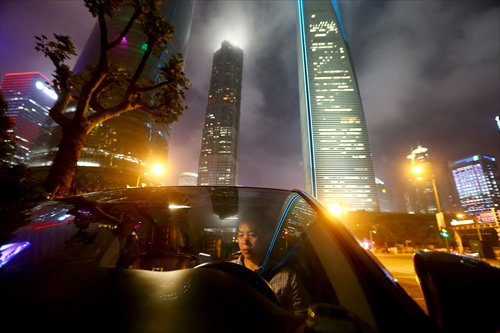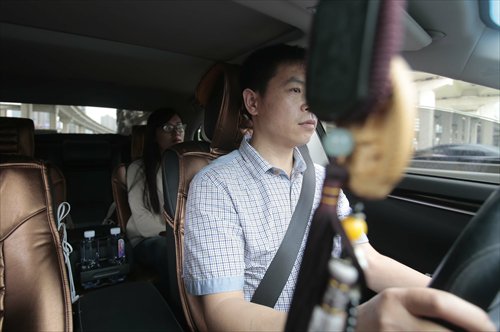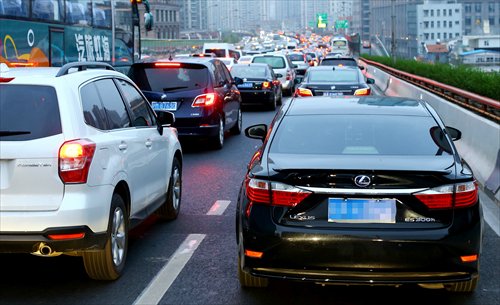HOME >> CHINA
Driving through limbo
Source:Global Times Published: 2015-6-2 18:28:01
Net-driven private car services thrive despite legal questions

Zhao Hui waits for customers at the Shanghai World Financial Center. Photo: Yang Hui/GT

Zhao loads barrels of water with his wife. Photo: Yang Hui/GT

Zhao drives a customer to her destination. Photo: Yang Hui/GT

Zhao checks an order from a car-booking app. Photo: Yang Hui/GT

Zhao's car is trapped in a traffic jam. Photo: Yang Hui/GT
Many private car owners in Chinese big cities have recently taken up part-time jobs as drivers for Internet-based car hailing services like Uber or Didi. It can bring them a significant income, but they risk fines, because the services have not been officially sanctioned by the government.
Zhao Hui, a water supply station owner in Shanghai, bought a 400,000 yuan ($65,000)-car last year and has become one of 1.35 million registered drivers with Didi, a major car-hire service firm in China.
The process of becoming a Didi driver was quite simple. After registering at Didi's website, Zhao had a training class at the company to learn how to serve passengers, such as opening the door of the car for them, and providing them free bottled water and facial tissues. After that, he passed a small test before being allowed to carry passengers on the road. "I didn't need to sign a contract with the company," he told the Global Times.
Every day, in addition to taking care of the water supply station with his wife, he spends time in his Lexus shuttling customers around, which can bring him as much as 15,000 yuan per month. "Within one or two more years I can pay off my car loan," he said with a smile.
The booming Internet ride-booking industry has grabbed many customers from taxi drivers, who have long been criticized as a monopoly.
In May, protests against the services by taxi drivers occurred in at least 16 cities. On May 27 in Zhengzhou, Central China's Henan Province, nearly 100 taxi drivers surrounded a driver for a Net-based car service and smashed his vehicle.
Days earlier, taxi drivers in Tianjin planned to blackmail their competitors by logging on to their services and reporting them to the police.
The country has banned private car owners from being involved in car-booking services through apps. But the authorities have now realized that the solution to the conflicts lies in the reform of the taxi industry, instead of restraining the car-booking services.
An official from the Ministry of Transport revealed on May 21 that a regulation to reform the taxi industry had been drafted and was soliciting professional advice. The government in Yiwu, East China's Zhejiang Province, has stepped ahead. It announced that it will cancel the operating fee for taxi drivers starting in 2016.
For now, all drivers like Zhao can do is avoid law enforcement officers.
Until the regulations are settled, companies like Didi can do little to help their drivers. "The car-hire service is still in legal limbo," said Wang Anping, a director at Didi's Shanghai branch. "What we can do for our drivers is to pay the fines for them when they are caught by police."
Posted in: In-Depth